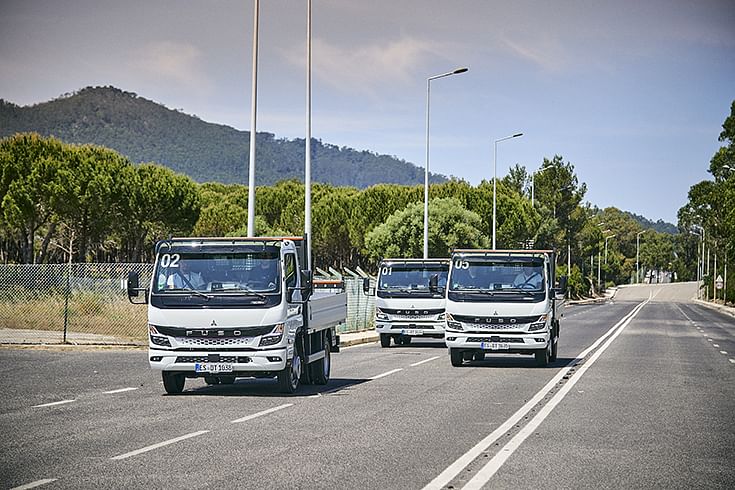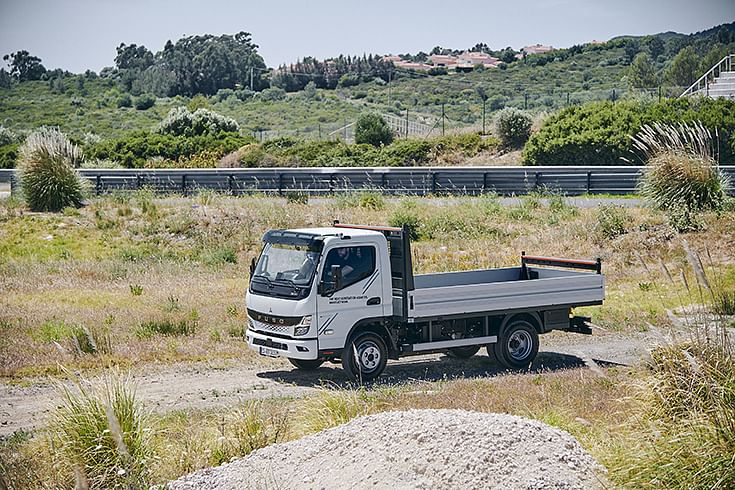Fuso begins production of new eCanter from Portugal plant
Mitsubishi Fuso Truck Europe plant in Tramagal, Portugal begins rolling out next-gen eCanter; total of 42 variants with six wheelbases and a GVW of 4.25 to 8.55 tons.
Following its European premiere at the IAA Transportation in Hanover in September 2022, Daimler Truck subsidiary Fuso has started production of the all-electric next-generation Fuso light truck in Europe.
May 22 saw the start of production at the Mitsubishi Fuso Europe (MFTE) production plant in Tramagal, Portugal, where the first next-generation eCanter from European production rolled off the assembly line.
For Karl Deppen, CEO Daimler Truck Asia, the start of production of the Fuso eCanter marks a milestone: "We at Daimler Truck are fully committed to the Paris Climate Agreement and making sustainable transport a success, which is why we aim to offer only CO2-neutral vehicles in our core global markets by 2039. An important part of that is supporting our customers’ transition to eMobility with the easy, efficient and electric eCanter starting production here in Tramagal. With this, we are taking an important step closer to CO2-neutral transportation."
Another milestone was that the Tramagal plant, which has been manufacturing the Fuso Canter since 1980, was the rollout of the 250,000th Canter.
Production of the all-electric light truck has already started in the first quarter at the sister plant in Kawasaki, Japan, which delivers the new eCanter in Japan as well as in all other non-European markets worldwide. In Europe, sales will initially start in 17 markets (France, Spain, Portugal, Italy, the UK, Ireland, Germany, Austria, Switzerland, Belgium, the Czech Republic, Denmark, Sweden, Finland, Slovakia, Greece and Poland).

More variants for greater flexibility
In order to meet customer requirements even better, Fuso, the Japanese subsidiary of Daimler Truck, has made several adjustments to the Next Generation eCanter. While the previous electric truck was exclusively available as a 7.49-tonner with a wheelbase of 3,400mm, customers now have the choice of six wheelbases between 2,500 and 4,750mm and a permissible gross vehicle weight of 4.25 to 8.55 tons. The load capacity of the chassis is up to 5 tons. The next-gen eCanter is powered either by a 110 kW (variants with a GVW of 4.25 and 6 tons) or 129 kW (variants with GVW of 7.49 and 8.55 tons) electric motor with an optimised driveline and 430 Nm of torque; the maximum speed is 89kph (electronically limited).
Depending on the wheelbase, three different battery packs are available: S, M and L. The batteries use lithium iron phosphate (LFP) cell technology whose highlights include a long service life and more usable energy. The battery pack in the S variant has a nominal capacity of 41 kWh and enables a range of up to 70 kilometres. In the M variant, the nominal capacity is 83 kWh and the range is up to 140km. The L variant, as the most powerful package, offers a nominal capacity of 124 kWh and a range of up to 200km. This is far more than the distance usually covered per day in light distribution traffic. Recuperation can increase the range even further, which at the same time minimises charging breaks. The first-gen eCanter only had a battery option with a nominal capacity of 81kWh and a range of up to 100 kilometers.

As far as battery charging is concerned, the new eCanter is compatible with all main voltages in the major markets. The charging unit supports charging with both alternating current (AC) and direct current (DC). The Combined Charging System CCS is the charging standard, and charging is possible at up to 104 kW. DC fast charging from 20 to 80 percent of capacity is possible in approximately 24 (S), 26 (M) and 39 minutes (L), depending on the battery pack; AC charging (11 and 22 kW) takes between around four and six hours, depending on the battery pack.
RELATED ARTICLES
Autoliv Plans JV for Advanced Safety Electronics With China’s HSAE
The new joint venture, which is to be located strategically near Shanghai and close to several existing Autoliv sites in...
JLR to Restart Production Over a Month After September Hacking
Manufacturing operations at the Tata Group-owned British luxury car and SUV manufacturer were shut down following a cybe...
BYD UK Sales Jump 880% in September to 11,271 units
Sales record sets the UK apart as the largest international market for BYD outside of China for the first time. The Seal...






 By Autocar Professional Bureau
By Autocar Professional Bureau
 23 May 2023
23 May 2023
 3527 Views
3527 Views





 Ajit Dalvi
Ajit Dalvi




